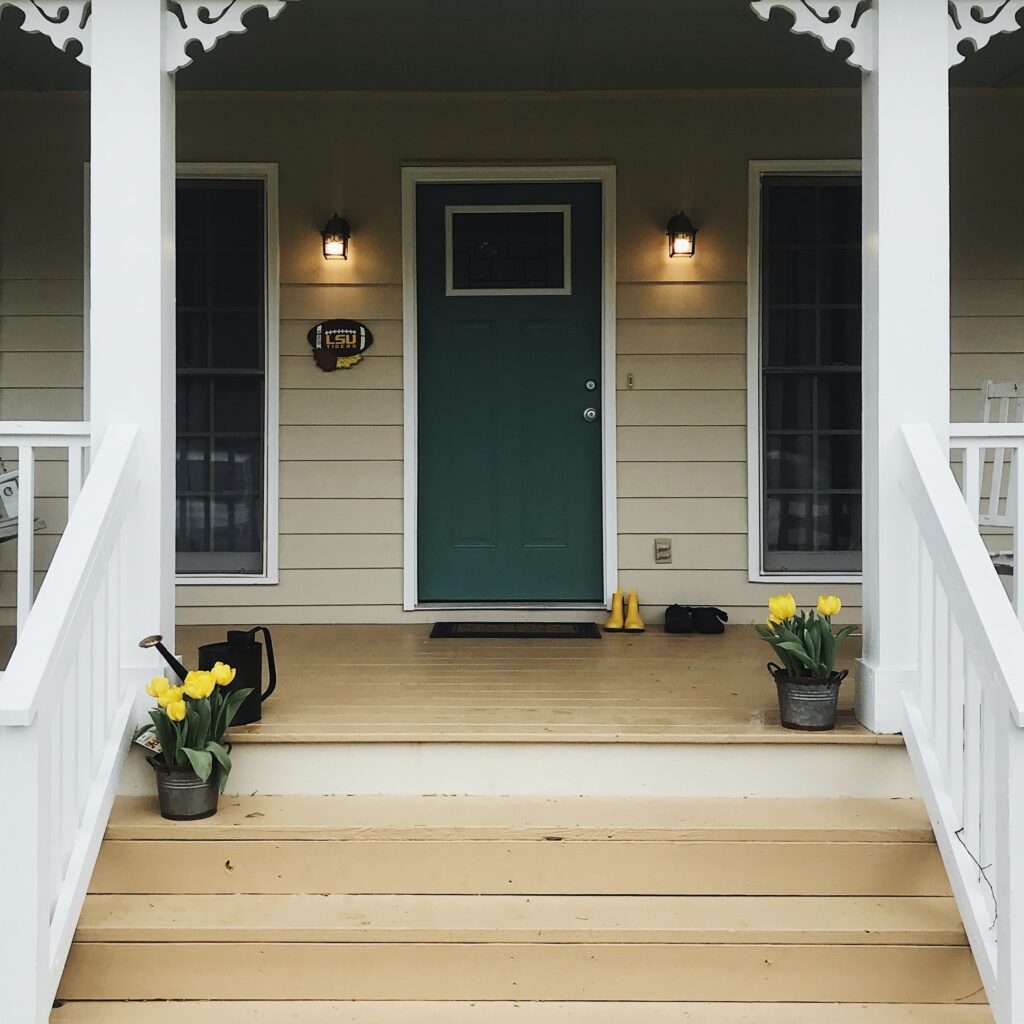March 2023
By Richard Fleming

I am captivated by porch lights. At twilight their soft glow is magical. As night deepens their radiance enchants. They offer a peaceful symbol of serenity. A quiet welcome to the night traveler.
It may seem strange for an old guy to be enamored with porch lights, but hear me out.
My fascination started when growing up in Potwin, one of Topeka’s oldest neighborhoods. Potwin encompassed a dozen blocks of Victorian and Queen Anne homes built in the late 1800s. From my earliest days I remember my parents turning on our porch light at dusk. They said it kept the house secure and the neighborhood welcoming. Around age eight, I took over flipping the porch light switch when the sun set. It felt like I was taking responsibility for insuring a peaceful night for my family. I would look out the front door to see the glow embracing the porch and steps. As evening darkened, the light seemed to brighten, spilling into our front yard.
In summer my friends and I played outside after the sun dropped below the prairie west of town. In the gloaming, Potwin’s porch lights illumined the neighborhood, setting the perfect stage for hide and seek. Some nights we ventured out to catch fireflies in glass jars, seeking darkened areas free of porch lights’ shine. Other times we sat on one of our porches and talked, looking beyond the warm patches of light and gazing into the night. We parked ourselves on a front porch swing, reminiscing about our recently-concluded fourth grade class and speculating on what the upcoming fifth grade year would bring. Sometimes we walked down Greenwood Ave., moving through alternating pools of dark and light, house by house, and we wished that summer would never end.
Each season yielded a different glow from the porch lights of Potwin. In autumn the puddles of light revealed leaves of red and orange shed by maple and elm, blowing to and fro. In winter nightfall came earlier. Porch lights blinked on in the late afternoons, their glow transformed from warm into cool. But they still offered calm comfort. Spring time saw porch lights grow slowly warmer, encouraging flower buds and the newly-awakened insects of the night to continue their pursuits.
As my years in Potwin went by, I continued my role as the designated light switchman. Even after we moved across the street to live in an older, bigger house.
Eventually I left Topeka for college. My journey took me to Chicago, then to California’s Bay Area where I still live today. There were times I lived in dorms or apartment buildings. While these structures possessed their own character, they shared a fundamental flaw. Their front lights were on auto-timers and required no human intervention. Some of the places I lived had no porches, but this was OK as long as they had front door lights which someone needed to turn on. At each stop in my journey, I always made sure the front light turned on at the necessary time.
It may seem quirky or quaint, but I have always felt the act of a simple human touch turning on the front light turns a house into a home. It is a gesture of welcome and an affirmation of community.
* * *
As my journey through life proceeded, evenings continued to be times of wonder. The most enjoyable parts of my days frequently occurred during my nights. Movies. Parties. Reading in a comfortable chair. Spending time with family. Dinners with friends. Community meetings working toward creating a more just society.
But after living through seven decades of nightfall, evenings now seem more subdued. Quieter. They are still pleasant, though in a gentler way. I no longer sit on a porch swing – our current porch is quite small – but night times now echo my nights in Potwin. The darkness once again prompts me to reflect on life. To consider what will happen with however much time is still allotted. Today, as I think back and think ahead, my field of view is far more expansive, and far more limited. I have far more experience with life to draw from, and far less time to apply the lessons.
Thankfully, as I grow older porch lights continue to resonate warmly. They imbue me with a sense of comfort and home. They are small beacons, calmly illuminating our paths through the darkness. At some point we each become a night traveler. When that good time comes, our journey will be eased by the magic of porch lights. This is why, when each evening arrives, I must always ensure the front light is warmly aglow.
* * *
If you enjoyed this post, please consider subscribing to be notified of future posts. Subscriptions are free.
